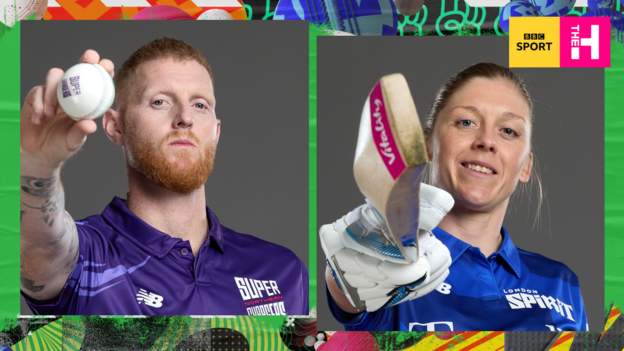The Hundred: Cricket set for new fast-paced, opinion-splitting tournament - 5 minutes read

Last updated on .From the section The Hundred
Over the next 32 days, the men's and women's competitions will run side-by-side with eight brand new teams, featuring many of the world's best players, competing to reach the finals on 21 August at Lord's.
The Hundred has split opinion throughout its build-up but promises to be cricket as the UK has never seen it before.
The Hundred is English cricket's attempt to grow the game by attracting a younger, more diverse audience.
It is the same sport but played in a new, shorter format which organisers hope will be easier to follow - each team batting for 100 balls and attempting to score as many runs as possible.
Eight city-based teams have been created - London Spirit, Oval Invincibles, Southern Brave, Welsh Fire, Birmingham Phoenix, Trent Rockets, Manchester Originals and Northern Superchargers - with each having picked two squads of 15 domestic and international players - one men's and one women's.
The tournament has been hit by the withdrawal of a number of high-profile international players, most because of issues related to travel during the Covid-19 pandemic, but it will still feature many of the best players in the world.
England's 2019 World Cup winners like Eoin Morgan, Jason Roy and Adil Rashid are set to play throughout, as are all of England's women's squad, including captain Heather Knight and world number one bowler Sophie Ecclestone.
England players selected to play India in the upcoming Test series, likely to be stars such as Joe Root, Ben Stokes and Jos Buttler, will play their team's first two games and possibly the final.
Each squad will also feature three overseas players - India sensation Shafali Verma, Afghanistan spinner Rashid Khan and South Africa's Quinton de Kock are the standouts - plus the very best from the domestic game.
Eighteen matches will be shown across BBC TV and iPlayer, including both finals, and BBC Music Introducing will also help provide live music and resident DJs at all 68 matches.
The tournament is not without its detractors.
Many argue is an expensive gamble or question whether it was necessary to bring in a fourth format when Twenty20 cricket is already successful.
One of the key aims of The Hundred is to showcase women's cricket and it will award equal prize money in the men's and women's competition.
There has been criticism, however, of the disparity in pay brackets - female players' contracts are worth between £3,600 and £15,000 but male players will earn between £24,000 and £100,000.
And an article in the Daily Telegraph earlier this week said the ECB had initially failed to respond to requests for support for female part-time players whose ability to work would be impacted during the tournament.
Critics also argue The Hundred devalues the long-standing county game, with the domestic 50-over competition - the format England are currently men's and women's world champions in - running alongside without its best players.
Fans of established county teams have said they do not have a team to support and others have suggested the tournament will sideline the 10 first-class counties whose grounds will not host Hundred teams.
Tom Harrison, the England and Wales Cricket Board chief executive, said English cricket would be in a "scary" place without the financial boost he hopes The Hundred can bring.
"I think people will discover a love for cricket who currently don't get an opportunity to," Harrison added.
"For cricket lovers I think you will find a place, even if it is hugely reluctant."
Responding to the Telegraph article, the ECB said: "We're pleased that through The Hundred more female cricketers are being paid to play the sport, and if any domestic part-time players face challenges carrying out their job safely while playing in the competition because of the Covid restrictions we'd encourage them to discuss this with their team or with us to assess what support we can offer."
The tournament begins with Oval Invincibles against Manchester Originals in the women's competition on Wednesday before the same two teams open the men's competition a day later.
From that point matches will be played as double-headers - the men's matches following the women's. All teams will play each other once in the group stage, apart from their paired 'rivals' who will play each other twice.
The team that finishes top of the table will progress to the final and the second and third-placed teams will meet in the eliminators on 20 August.
The biggest change to current forms of cricket is each 100-ball innings is essentially split into 20 five-ball overs.
All five balls must be delivered by the same bowler but a captain can choose to continue with the same bowler for 10 consecutive balls.
After a set of five balls the umpire will hold up a white card to signal the end of each over, but players will only change ends after every 10 balls - not at the end of each over.
Matches will last two and a half hours with each innings 65 minutes. A fielding team will be punished by having one fewer fielder allowed outside the inner circle if they fall behind their allotted time.
And with live music a big part of events off the field, the toss will take place on the music acts' stage, rather than on the field.
Source: BBC News
Powered by NewsAPI.org